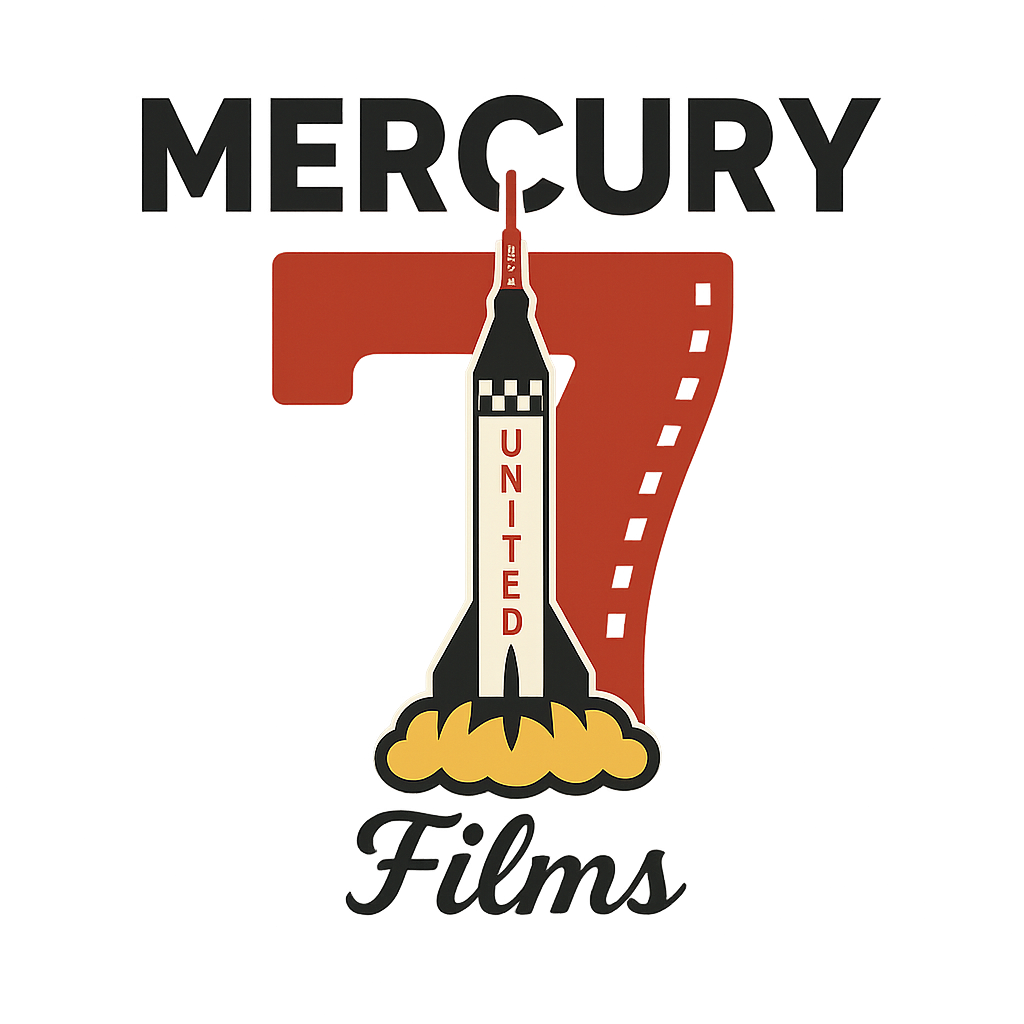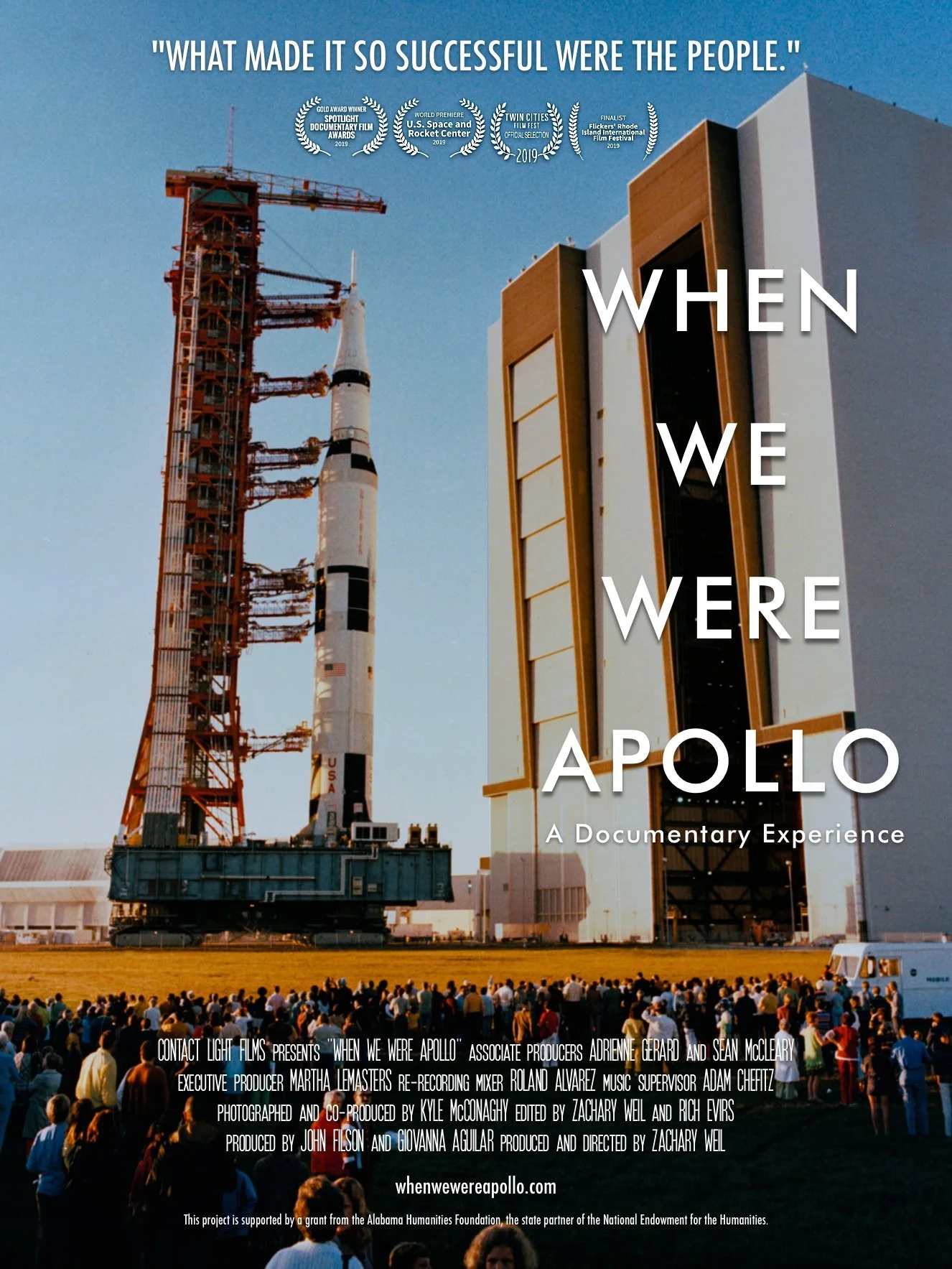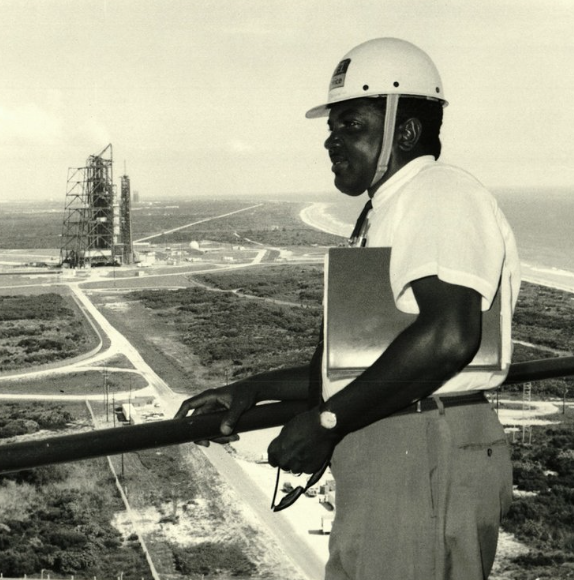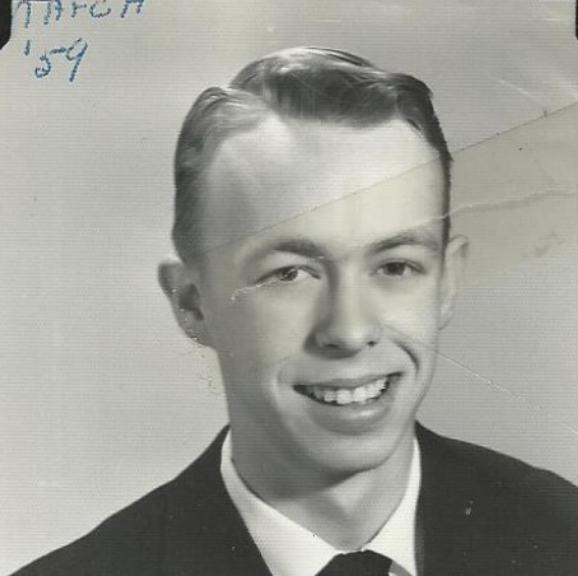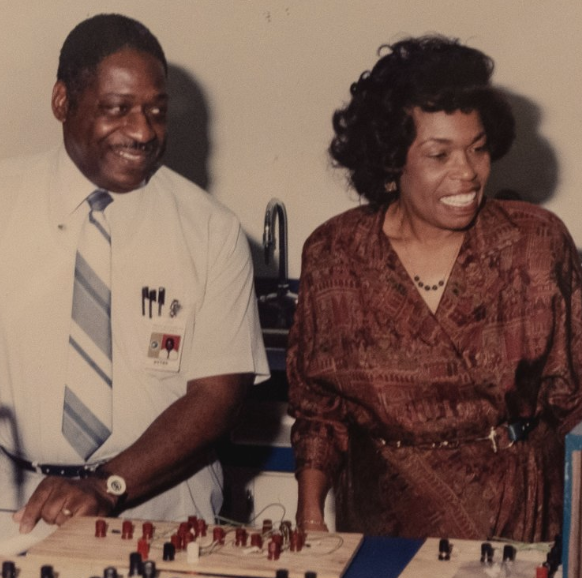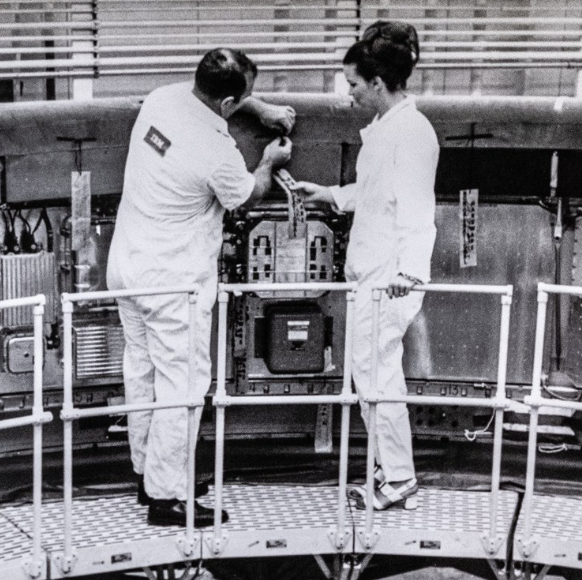When we were
apollo
Who were the men and women of Project Apollo? Where are they today? What do they think of the extraordinary effort they helped make possible? Recipient of a Sun Coast Regional Emmy® in the Historical Documentary Category, When We Were Apollo is an intimate and personal look at the Apollo Space Program through the lives and experiences of some of its most inspiring behind-the-scenes figures: engineers, technicians, builders and contractors who spent the better part of a decade working to get us to the moon and back.
Following its premiere on PBS stations in the Summer of 2019, the Program continues to find new audiences with broadcasters and streamers around the world.
To purchase a copy of When We Were Apollo, please click here

WHY APOLLO MATTERS
More than half a century later, the Apollo Space Program remains the single greatest initiative in peacetime the world has ever known. Its story speaks to the most beautiful characteristics of our humanity: a metaphor for our ability to rise to challenges once thought insurmountable, and push past them with even bigger and bolder solutions.
Behind every astronaut who set foot on the moon and every figurehead who inspired us to get there was Apollo's massive workforce—a team of men and women over 400,000 strong, spanning race, socio-economics, culture, company and country, who came to understand that the overall Program was only as good as the effort they put into it.
This dedication and the “can-do” attitude behind it—the Spirit of Apollo—carry invaluable lessons about our potential as a species as we chart a course through the 21st century. Like Apollo, our world is too big, diverse and complex for any one person, group or nation to tackle. Only by working together—by taking a truly cooperative approach and empowering each other to become the best versions of ourselves—will we truly be able to overcome the seemingly insurmountable challenges of our time. Such a future is within our grasp. The story of Apollo can help us get there...if we listen.
Interviewees
The nineteen men and women featured in When We Were Apollo represent a small but formidable fraction of the estimated 400,000-plus workforce who landed twelve astronauts on the moon and returned them safely to the earth. Our film is dedicated to their steadfast commitment—and with it—the conviction that we all have the ability to accomplish wonderful things when given the opportunity and the support to be successful.
“I was the youngest guy by far—seventeen years old—and I didn’t know A from Z. But they were willing to teach me. It was special. They cared about whether I was going to be successful or not.”
“I remember going home on weekends, talking to guys. They thought [the Redstone rocket] was sort of a Buck Rogers kind of thing. I convinced them it wasn’t Buck Rogers; we were going to do it.”
“I was a part of the telametrics department. And my department manager made it very clear; he said ‘I love excellence. I want people who are going to come in here, who are not only going to help us achieve our objective, but bring what wisdom they have to improve upon it.’”
“It was such an incredibly exciting challenge. That the country was put on notice to [go to the moon], and to do it within a particular time. And to commit!”
“I was sixteen. We were at a golf course. It was where all the high schoolers went to make out. My brother comes roaring in and just shouts: ‘We put up the first American satellite!’ You know, most of us don’t use the word ‘satellite’ back then.”
“I’d always worked in the Huntsville Operations Support Center. I’d never seen a Saturn fly. So, I took annual leave, and I took my son to see the last shot to the moon. We didn’t know it was all over then. But, it was all over.”
“People weren’t being forced to work these long hours. But, they did so by choice. And I think they were so engrossed with what they were doing, and the need to accomplish the work. When eight hours ended, they didn’t want to quit.”
“I went to work for the Army Corps of Engineers. It was either one of the generals or a colonel that came out and said: ‘JFK wants to put a man on the moon. They’re going to build a space center down in Florida. Any volunteers?’”
“Apollo was done by people thirty and under primarily. So you had all of these folks that were willing to work twelve, eighteen hours a day to make this happen. And I just don’t see another project out there like that.”
“Everybody knew what the final goal was. And nobody wanted to be the cause for having to move that goal.”
“After the pad fire that killed the three astronauts, NASA said: If we have another disaster of like nature that kills the crew, Congress will cut off our funding, and that’ll be the end of the program. Everybody had that attitude. They knew it was that close to the end of the program.”
“In high school I had a teacher, and she would tell me: ‘You got a good head on your body for being a mathematician.’ And I guess that stuck. And that’s what I tried to do.”
“I was interviewed by one of the Germans, and I was impressed by him. I was not impressed with the facilities though; they were very austere. I deliberated over it and finally I decided: Well, I believe it’s worth a chance. And that’s about the best decision I ever made.”
“I was born in El Paso, Texas, while my parents were there under special orders of Congress: Operation Paperclip. About half of the [Wernher von Braun] team were taken by bus daily out to White Sands proving grounds, so they could share with captains of industry and professors, what is this unique thing—this rocket—that they built back in Germany during the war.”
“Mind-boggling! The first day when they drove me out to the Pad, and I looked down, and I looked up, I thought: You know, there ain’t no way in the world [the Saturn V rocket] is getting off the ground. Seven and a half million pounds! How could it ever get off the ground?”
“[The Kennedy assassination] made me feel a degree of insignificance. If people who are in the limelight—who are doing great things—can be so easily disposed of, then who am I? It just kind of put that in perspective.”
“[Apollo] demonstrated that with the will of the people and the backing of the politicians and the money, the nation can accomplish wonderful things. That’s the way most of us look back on it and say: Indeed, we made it happen. We were part of that. And we’re proud of it.”
“I wasn’t an integral part of [the Apollo program]. I had my job, which was to write about these brilliant people. I feel like I was the witness. I was the voice. I think it’s the greatest technological team that’s ever been formed.”
“We need national goals, not unlike the Apollo Program. Apply it to health. Apply it to education. Bring everybody in on the act. They can have a sense of pride. A sense of belonging. A sense of ownership. And a sense of responsibility.”
This film was made possible by a passionate and dedicated team of funders, Kickstarter backers and supporters who believed in its potential from the very beginning:
Alabama Humanities Foundation, Ronald and Kathleen Weil, Pierce, Fenner & Smith, Inc., Ina Brown, Kenneth Mitchell, Robert Fish - USS Hornet Museum, Torch Technologies, Craig Scholoman, Doug Forrest, John Montrym, Michael Natkin, Monika Pollwein, Richard Dickins
ADAM CLARKE, ADRIAN RODGERS, ALASTAIR LOCKHART, ALEXANDRA WEIL, ANDREW & LEAH HALL, S. ANDREW McCULLEY, ANNE ERICKSSON AGGER, ANTHONY S. JOHNSON, BEN PALMER, BENJAMIN KALTENBERGER, BERND BERSCHICK, BILL HOLLAND, BLAKE MARSHALL, BOB COVEY, BONNIE SAYRE VENABLE, BRANDON R. LUBLIN, BRETT ERIK JOHNSON, BRIAN ANTONOFF, BRIAN FLOCA, BRIAN MAY, BURKE BURNETT, CASEY CASLER, CATHERINE & DEE KATAUSKAS, CHARLES BAREST, CHARLES W. (BILL) JOHNSON, CHARLES K. RODGER, CHRIS WOUDSTRA, COLLEEN LUCZKO, CROSS PRODUCT CREATIONS, CURRAN DANDURAND, DAKOTA COTTON, DARNELL HESTER, DAVID DAYHUFF, DEBBIE & GEORGE LUCZKO, DENNIS F. PETRUCCI, DONALD CROSSMAN, ED POWELL, EDGAR DE VEIJ, EMILY IMMING, ERIC MESSINA, ERIC J. ROWE, ERIC TURNROSE, EVAN BURTON, FREDERIC ARTNER, FREDRIK ABERG, GARY & SARAH KENDALL, GERHARD GRECHENIG, GERARD G. McMAHON, GRAHAM BAGSHAW, GRAHAM BIRD & JODY SAVAGE, HANNAH McKINLEY, HARRY McCARTY, HERVE GONAY, IAIN McCRAY MARTIN, JAMES P. HOBBS, JEANIE GAIL BOWMAN Ph.D., JEFFREY HOPPERT, JEFFREY KETTERER, JEFF LOTTERMAN, JEFF QUALLS, JEMMA HALL, JENNIFER NICKLYN, JIM FRANGIONE, JIM STONE, JIM TAN, JIMMY HORROCKS, JOE & SARA DeTOLVE, JOHN WALKIEWICZ, JOSEPH CAMEAU, JULIAN DAVID STONE, JULIE McDERMOTT, KEN CLARK, KEN GLOVER, KENNETH PENNING, KEVIN WAGGONER, KEVIN RODGER, KHUONG B. CHAU, KYLE COREY, LARRY BILINSKI, LAWRENCE M. GREEN, LINDA SCOTT, LIZ AHL, LORENZO DUTTO, LYLE SHOOSTINE, MARC ALAN PARSONS, MARC ROULEAU, MARJORIE DeHEY, MARK BEAMES, MARK BERRY, MARK DODSON, MARK GRAY, MARY OLSZEWSKA, MATTHEW MORNICK, MELISSA HOOPER, MICHAEL BECKERS, MICHAEL HWANG, MICHAEL RAPKIN, MICHAEL RUDIN, MIKE GEORGE, MISCHA BOENDER, MITCH PATTERSON, THE NATKIN FAMILY, NICOLAS COMBARET, NORMAN JAFFE, PAT HUFF, PAUL WILKINSON, PAUL B. WEAVER, PER LINDSTRÖM, PERRY OFFER, PETER LYNGSOE, RAINER THUNE, REAGAN GRIMSLEY, REBECCA GRIFFIN, RICARDO DEMARCO LOPEZ, RICK ARGIRO, ROBERT AHDOOT, ROBERT ANDERSON, ROBERT KUNOV, BOB TAMMY, STEPH, & NICHOLAS SPERLING, ROBERTO LICARI, THE CARLOCK FAMILY, THE PELICAN MAN, SIMON M. SMITH, SPACE COLLECTIBLES, STEVEN FRIEDLAND, STEVEN McHUGH, STEVE GERADS, STEVEN SPENCE, STEVEN & KIM WRIGHT, STUART SABEL, TANYA & KARL LUEDKE, TEISHA & AARON PRIEST, THOMAS REDNOUR, TIM PEPER, TIM TURAN, TODD CHAMBERLAIN, TODD ERSKINE, TODD SCHOLTON, TY FARRIS, VICKI LYNCH, VINCENT SOLIS, WALTER A. MORRIS, WAYNE & VICKI OWENS, WERNER LOEBACH, WILLIE (BILL) WEAVER, ZACK STEIN.
